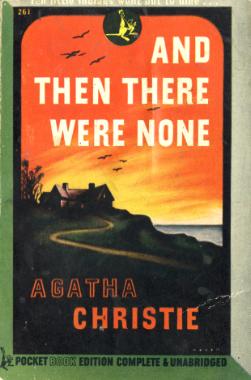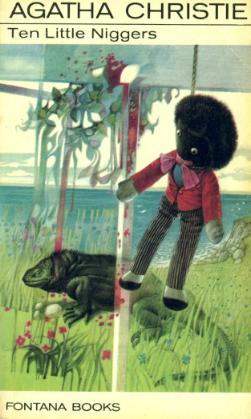.jpg) The
Worst Title in Literary History
The
Worst Title in Literary History
.jpg) The
Worst Title in Literary History
The
Worst Title in Literary History
The oddity here is not that the title is so incredibly BAD, but that the work of fiction that it represents is so incredibly GOOD. Some mystery fans (including myself) believe this to be Christie's best work, and it was by far her best selling book. It was possibly the most original mystery plot to date, and it ranks high on most mystery lovers' lists as one of the greatest ever written. The book was first printed in 1939, and it was only a matter of time before it was adapted for the London stage. This Samuel French play book is a first printing, 1944.
So why haven't Americans ever heard of it?
Actually, it was first printed in the U.S.
the same year it was written, serialized in the Saturday Evening Post. But American
publishers refused to even consider using this title. Christie renamed it for
distribution in the U.S. and published it as And Then There Were None.
The rather cruel children's rhyme that the book was based on was changed
to "Ten Little Indians," Christie changed the name of the island where the
ten characters gather to "Indian Island," and everywhere the offensive word appeared in the text, it was changed to Indians. Eventually, the name of the play was
also changed to "Ten Little Indians." There would be at
least four motion pictures, two under the title "And Then There were None"
(1945 & 1974) and two under the "Ten Little Indians" title (1959 &
1965).
word appeared in the text, it was changed to Indians. Eventually, the name of the play was
also changed to "Ten Little Indians." There would be at
least four motion pictures, two under the title "And Then There were None"
(1945 & 1974) and two under the "Ten Little Indians" title (1959 &
1965).
 While the
offensiveness of the original book title was immediately transparent in the
United States, the nature of the racial slur was either not as acutely felt in
in Great Britain, or publishers simply didn't care enough to force the Grand
Dame to agree to an alteration. The book continued to be reprinted under all
three titles for decades. The worst of all (in my opinion) is Fontana Books
#1727, printed in Glasgow in 1978, which sports a cover depicting an African
effigy that has been hanged. While it is obvious that Ms. Christie's intent in
the book was not overtly racial, such graphic images dredge up memories of
racial atrocities around the world, and especially in the United States
during the first fifty or sixty years of the twentieth century.
While the
offensiveness of the original book title was immediately transparent in the
United States, the nature of the racial slur was either not as acutely felt in
in Great Britain, or publishers simply didn't care enough to force the Grand
Dame to agree to an alteration. The book continued to be reprinted under all
three titles for decades. The worst of all (in my opinion) is Fontana Books
#1727, printed in Glasgow in 1978, which sports a cover depicting an African
effigy that has been hanged. While it is obvious that Ms. Christie's intent in
the book was not overtly racial, such graphic images dredge up memories of
racial atrocities around the world, and especially in the United States
during the first fifty or sixty years of the twentieth century.
The novel is still in print, but to my knowledge, the title with the racial slur is not one of those that is still "active."
Now, you might also argue that the "Ten Little Indians" title is actually rather demeaning to Native Americans.
And you'd be right, of course.